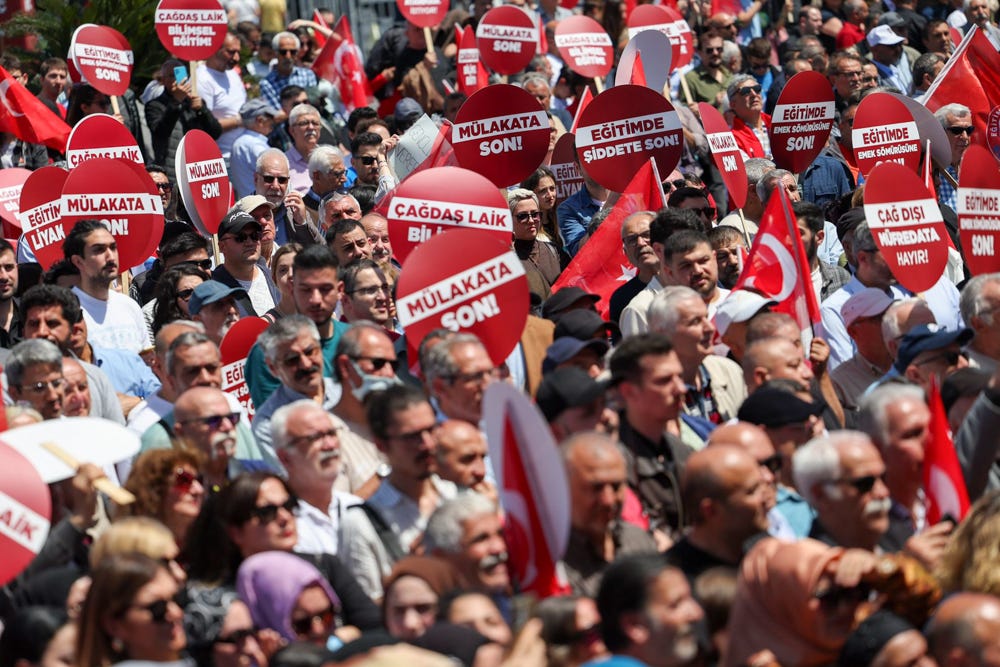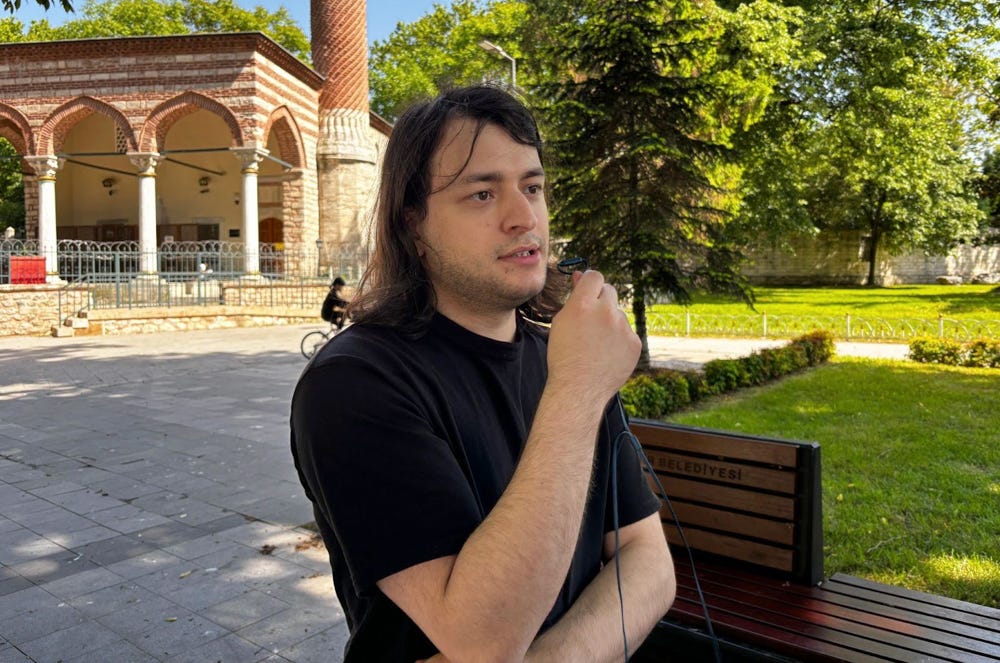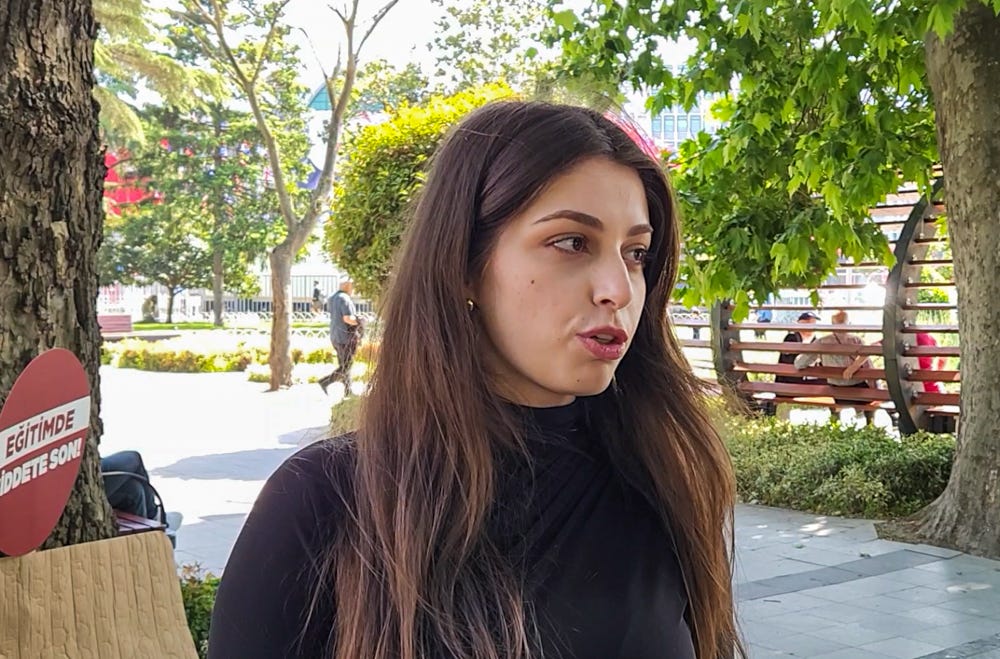İSTANBUL – Last spring, Eray Bulut, 23, finished his studies to become a Turkish teacher and graduated from Marmara University. About a year later, he has yet to start working.
Bulut is one of many teachers in Turkey waiting to be appointed to state schools. Although there are no official figures, estimates indicate hundreds of thousands of teachers are in the same situation.
The backlog of education graduates comes as the Education Ministry employs students from other disciplines as part-time teachers to fill the gaps. As a result, education sector graduates are growing increasingly frustrated, while experts question hiring practices and the general quality of public education.
The issue comes amid a controversial curriculum reform that will place more emphasis on national and religious values in the coming school year.
The main opposition Republican People’s Party (CHP) has pushed back on both developments and recently placed the spotlight on the teacher appointments issue by holding a ‘Big Education Rally’ on May 18 in İstanbul.
Distrust in the interview process
In the Turkish education system, teachers looking to work for a state school need to be appointed by the Education Ministry. Teachers cannot choose which school they’ll work at, though they can list their regional preferences.
To be appointed after graduation, candidates must pass the Public Personnel Selection Exam (Kamu Personel Seçme Sınavı, KPSS), a compulsory test to work at certain state institutions. If the candidate gains enough points on the test, they will take part in an oral interview (called mülakat in Turkish), a requirement imposed since 2016.
The oral interview process has long been a magnet for criticism. So much so that top government officials have indicated they’d like to change the system. Prior to the May 2023 general elections, both Pres. Recep Tayyip Erdoğan and opposition candidate Kemal Kılıçdaroğlu promised the interview process would be abolished.
Yet in September 2023, the newly appointed Education Min. Yusuf Tekin said the process of appointing teachers might take longer because he wanted to create a “proper interview project”.
“We decided to conduct the interview like real interviews,” Tekin said at the time.
The statement further deepened distrust and suspicions in the hiring process. Many candidates have alleged the interview commission is not objective in assessments and that such a system leaves the door open to nepotism.
Eray Bulut, the aspiring teacher, echoed similar doubts about the interview process.
He ranked in 262th place for the nationwide KPSS, a more than sufficient score to secure a position, but he is concerned about the interview, which accounts for 50 percent of the total score.
Bulut is currently preparing for his interview after appointments were delayed earlier this year. The Education Ministry is expected to begin conducting candidate interviews on July 1.
“I read the content of the interview [recently] and I got demoralized,” Bulut told Turkey recap. “I have already passed the exam with questions about general culture and educational sciences. How will you understand whether I can be a teacher or not from a random question in the interview?”
Some commentators criticize education candidates, arguing many students expect guaranteed jobs and that they essentially want privileged positions on the labor market. Though education policy expert Yeliz Düşkün said the underlying problem with the interview process is a general lack of trust in state institutions.
“It is already a polarized country, there are already a lot of problems in terms of nepotism,” Düşkün told Turkey recap. “There are many problems even for written exams, such as plagiarism. That is why no one trusts interviews, it is seen as favoritism or clientelism.”
She continued, saying interviews are good to measure communication skills, but Düşkün believed the Education Ministry does not have the staffing capacity to conduct the large number of annual assessments in a timely manner.
In recent weeks, CHP leader Özgür Özel has been directing more attention to the topic, as with the previously mentioned education rally. Eray Bulut attended the event, which was also joined by many retired teachers.
This year, educators expected 68,000 teachers to be appointed – the same number as the official teacher shortage according to the Ministry of Education. Yet in May, Tekin announced 20,000 teachers would be appointed.
The figure corresponds with the number of teachers that will be retired this year, and is in line with Finance Min. Mehmet Şimşek’s public savings program, which dictates state workers can only be hired to fill slots left by retirees.
The measure received criticism from Eğitim-Sen, the left-wing Education and Science Workers' Union.
“Appointments should be made according to the real need for teachers, and permanent solutions should be produced for the growing problem of unappointed teachers,” Eğitim-Sen said in a statement.
Alternative hiring route: Ücretli öğretmen
Meanwhile, there is an alternative route for teachers to get a job through a practice known as ‘paid teachers’ (ücretli öğretmen in Turkish).
So-called ‘paid teachers’ are basically part-time workers that can be assigned to teach a single course if there are insufficient permanent and contracted teachers employed by the ministry – the teachers who have to pass the KPSS and the interview.
The eligibility requirement for ‘paid teachers’ is to be a university graduate from any area of study. Pedagogical training is not obligatory, though prospective ‘paid teachers’ can take pedagogical courses at some universities.
“Can you think of something like this?” Düşkün asked. “For example, when a hospital needs a doctor, you pay to employ a doctor with no medical education. Impossible.”
‘Paid teachers’ are also paid far below minimum wage at 75.15 TL per hour and do not receive other social security benefits extended to permanent teachers. Düşkün said she believes the ‘paid teacher’ system both lowers the status of the profession and is one of the main reasons for the backlog in appointing permanent teachers.
She estimates about 75,000 ‘paid teachers’ are currently employed in the Turkish education system, noting that at the same time, fully-trained educators are not able to find job positions.
“This is not the behavior of an institution pursuing quality,” Düşkün said.
From ‘paid teacher’ to paying teacher
Bahar Doğan, 26, has worked as a ‘paid teacher’. She graduated from the Turkish Language and Literature department of Marmara University.
“I do not have any criticism for those who work as paid teachers, but I do criticize those who make us dependent on them,” she told Turkey recap.
Doğan served as a ‘paid teacher’ for half a semester before she stopped, citing poor working conditions.
“I saw that I could not do enough for the children and that my insurance was half-paid even though I did the same job [as other teachers] … This is nothing but unfair,” she told Turkey recap during the CHP Education Rally in İstanbul.
“While institutions in the private sector violate teachers' rights, the state also exploits us,” she added.
Another participant at the education rally, Fatoş Başboğa, 23, said difficulties in getting a teaching job led her to give up on the profession altogether. After graduating with an education diploma, Başboğa tried to work as a ‘paid teacher’, like many of her classmates.
“I gave up when I realized that the salary I would receive did not even cover my travel expenses or my food,” Başboğa told Turkey recap.
Başboğa currently works as a stewardess for an airline company. She left teaching after many attempts to get appointed.
“I'm not thinking of going back either. I left this profession not because my current job is very good or because it improved my living conditions, but because I did not see a future in teaching," Başboğa said.
She added, “We all enter the [education field] to raise bright students. We all want to be teachers, but the system does not allow us."
This newsletter is supported by readers via Substack and Patreon. Paid subscribers get full access to our recaps, reports, members-only Slack and news tracking tools. All proceeds go towards sustaining our journalism.
Turkey recap is produced by the Kolektif Medya Derneği, an İstanbul-based non-profit association founded by our editorial team to support and elevate news media and journalists in Turkey. Contact us: info@turkeyrecap.com
Diego Cupolo, Editor-in-chief @diegocupolo
Gonca Tokyol, Editor-at-large @goncatokyol
Ingrid Woudwijk, Managing editor @deingrid
Verda Uyar, Digital growth manager @verdauyar
Emily Johnson, Deputy editor @emilyjohnson
Damla Uğantaş, Tr Türkçe editor @damlaugantas






